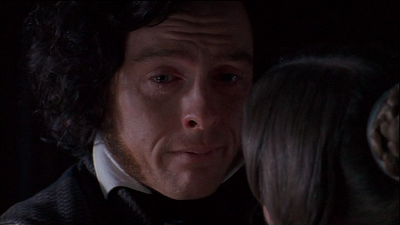I'm quite late with this post, again! But as you can see, I've gone screen cap crazy and I had a few problems getting them uploaded to blogger, why won't it let me in!! And I've been busy, sorry about that.
This has been the most looked forward to episode of any programme I've watched this year, the reasons being, the acting, the actors and the gorgeous cinamatography; some frames had real filmic qualities and the whole series had a gorgeous aesthetic, which highlighted the atmosphere and underpinned the drama extremely well.
We start with Jane asleep on a rock, penniless, alone and driven to drinking water from a rock pool. Ruth Wilson looks suitably bereft, disheveled and destitute.
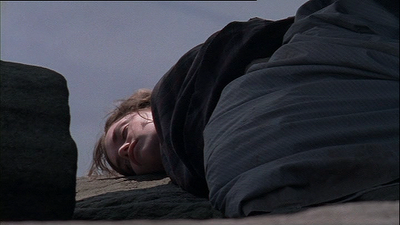 The director, Susanna White, has made wonderful use of the moors, they mirror Jane's bleak, empty feeling, vast and seemingly unending.
The director, Susanna White, has made wonderful use of the moors, they mirror Jane's bleak, empty feeling, vast and seemingly unending. 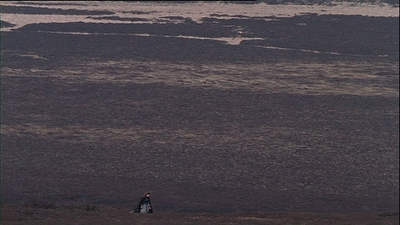 I like the artful smudges of dirt that they have used here, it puts me in mind of Oliver! I almost expect her to burst into song. Jane's hair is so messy here because she left her bonnet beside a rock pool in her haste to escape the creepy shepherd that was watching the strange wandering lady, who was drinking from a rock pool. (In my real life, I analyse water for a living; believe me, you don't want to drink untreated water, I know what's in it! I hope that was a stunt pool, specially created, or it is what explains Ruth Wilson's illness during the shoot.)
I like the artful smudges of dirt that they have used here, it puts me in mind of Oliver! I almost expect her to burst into song. Jane's hair is so messy here because she left her bonnet beside a rock pool in her haste to escape the creepy shepherd that was watching the strange wandering lady, who was drinking from a rock pool. (In my real life, I analyse water for a living; believe me, you don't want to drink untreated water, I know what's in it! I hope that was a stunt pool, specially created, or it is what explains Ruth Wilson's illness during the shoot.) Jane is rescued by St.John (SinJun as it is pronounced) and his two "excitable" sisters. I put the word in quotes, because it is what Alison Graham in the Radio Times described them as. And she got it spot on. They were lively and generous, somewhat prone to flights of fancy and slightly intrusive questions such as: "Are you having a bad memory?" Their detective work was limited to reading the labels on Jane's dress; investigative masterminds these two aint. But I think they were portrayed elegantly and sparely, letting us know enough about them, without clogging up the narrative too much.
Jane is rescued by St.John (SinJun as it is pronounced) and his two "excitable" sisters. I put the word in quotes, because it is what Alison Graham in the Radio Times described them as. And she got it spot on. They were lively and generous, somewhat prone to flights of fancy and slightly intrusive questions such as: "Are you having a bad memory?" Their detective work was limited to reading the labels on Jane's dress; investigative masterminds these two aint. But I think they were portrayed elegantly and sparely, letting us know enough about them, without clogging up the narrative too much. 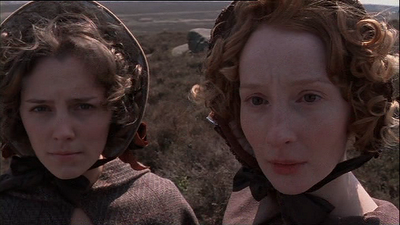 St. John Rivers, on the otherhand, is almost the opposite to his sisters, where they are lively and curious, he is dry and fastidious. I'd like to bring attention to the sterling work that Andrew Buchan did. He brought St. John to life and gave him the right amount of austerity and reserve, and without making him overly priggish and overbearing. This is a gentler man than in the novel, where he almost browbeats Jane into marrying him, here he is a man devoted to God and mindful of his position in society, so much so that he rebuffs Miss. Rosamund Oliver's friendly gestures.
St. John Rivers, on the otherhand, is almost the opposite to his sisters, where they are lively and curious, he is dry and fastidious. I'd like to bring attention to the sterling work that Andrew Buchan did. He brought St. John to life and gave him the right amount of austerity and reserve, and without making him overly priggish and overbearing. This is a gentler man than in the novel, where he almost browbeats Jane into marrying him, here he is a man devoted to God and mindful of his position in society, so much so that he rebuffs Miss. Rosamund Oliver's friendly gestures.
I have a soft spot for St. John, when I'm reading the book, I always shout (in my head) "marry Rosamund Oliver, you idiot!" I liked St. John's " This talk is pleasant, you may continue for another quarter of an hour", and then he gets his watch out. Talk about clock watcher.
The differences between St. John and Rochester are apparent, while Rochester would have given way to his passions, St. John on the other hand hides and suppresses his feelings (passion?) for Rosamund. His ambition is to be a missionary and to do God's work, there is no room for feelings or passion. His clothing is naturally clergyman black, and his collar looks as if it is about to choke him. 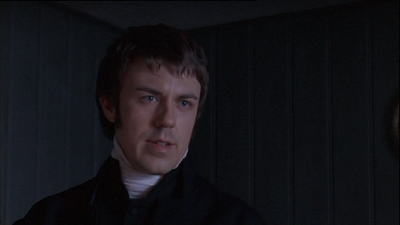 While walking on the Moors, Jane and the Rivers, meet Rosamund, who has been going out of her way to talk to and invite St. John to dinner. He, ever the insensitive idiot, refuses and she walks back dejected, wishing she hadn't put her best hat on. Her shoes also looked entirely unsuitable for a country walk.
While walking on the Moors, Jane and the Rivers, meet Rosamund, who has been going out of her way to talk to and invite St. John to dinner. He, ever the insensitive idiot, refuses and she walks back dejected, wishing she hadn't put her best hat on. Her shoes also looked entirely unsuitable for a country walk.
 St. John proposes that Jane become the School Mistress at the newly formed Girls school. He proudly shows Jane a muddy barn, with a box in it. At least Lowood had floorboards! I suppose this was so Jane can bring nature into the classroom, literally.
St. John proposes that Jane become the School Mistress at the newly formed Girls school. He proudly shows Jane a muddy barn, with a box in it. At least Lowood had floorboards! I suppose this was so Jane can bring nature into the classroom, literally.
Jane accepts the offer, but in her characteristically forthright way, states "no beatings" and the freedom to set her own curriculum. St. John agrees and her salary is to be £ 30 a year, just the same as when she was Adele's governess.
I believe that Rochester still owes her £5 pounds, she never got the remainder of her wages after returning from Aunt Reed's funeral. Stingy git.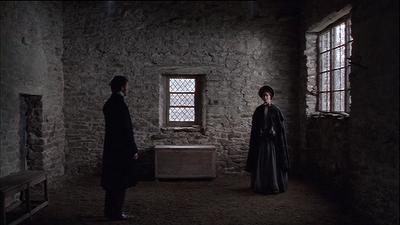 The school comes with a black board, mud, a clock, a bell and an adorable little girl who cutely can't tell the time, but can ring a mean home time bell. From the state of her hair, she doesn't know how to comb her hair either.
The school comes with a black board, mud, a clock, a bell and an adorable little girl who cutely can't tell the time, but can ring a mean home time bell. From the state of her hair, she doesn't know how to comb her hair either.
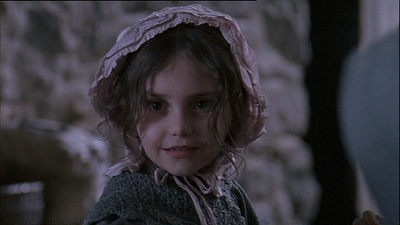 Jane reminisces about her and Rochester's last meeting, which takes place, somewhat unwisely in her bedroom. Rochester, strokes and caresses and whispers huskily into her ears. Jane mutely allows him to do so (and is probably secretly enjoying it).
Jane reminisces about her and Rochester's last meeting, which takes place, somewhat unwisely in her bedroom. Rochester, strokes and caresses and whispers huskily into her ears. Jane mutely allows him to do so (and is probably secretly enjoying it).
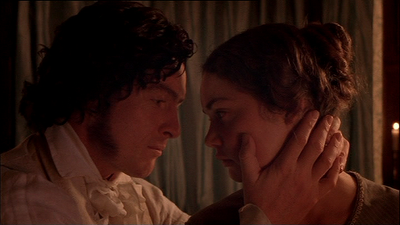 The touching I liked greatly, it wasn't strictly in keeping with book, but it had a sensual effect, which no doubt was the directors intention. The kissing on the other hand seemed to me to be a sop to the more romantic viewer who needs everything spelled out; it screamed "this scene is meant to be sexy and erotic!" I just felt a bit uncomfortable, I would have preferred a few caresseses and husky whispering, it would have been far more effective to have kept the kisses till the reconciliation scene, instead of shoe horning them in here.
The touching I liked greatly, it wasn't strictly in keeping with book, but it had a sensual effect, which no doubt was the directors intention. The kissing on the other hand seemed to me to be a sop to the more romantic viewer who needs everything spelled out; it screamed "this scene is meant to be sexy and erotic!" I just felt a bit uncomfortable, I would have preferred a few caresseses and husky whispering, it would have been far more effective to have kept the kisses till the reconciliation scene, instead of shoe horning them in here.
I know quite a few viewers liked the kissing on the bed, maybe I will when I rewatch, but at the moment, it just seems too overt and explicit a scene to have before the end. I do think it diluted the chemistry between them and would have far rather preferred a pleading Rochester to a kissin' Rochester, well at this point anyway.
Here Rochester has just realised that his manly bulk pressed down on little Jane has caused her to stop breathing, so he hurriedly administers the kiss of life.
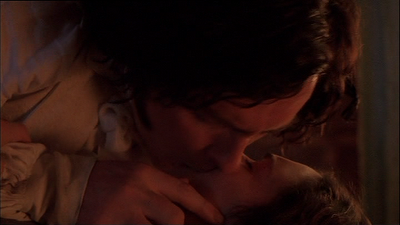 Having revived Jane, her promptly rolls off and looks over to make sure Jane is now breathing. Jane gasps a little for breath.
Having revived Jane, her promptly rolls off and looks over to make sure Jane is now breathing. Jane gasps a little for breath.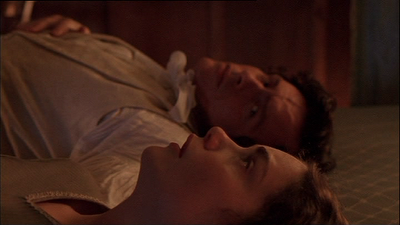 This part of the scene was far more effective, Rochester tenderly holding Jane and whispering pleadings into her ear. If the entire scene had been done like this, I would have liked it better.
This part of the scene was far more effective, Rochester tenderly holding Jane and whispering pleadings into her ear. If the entire scene had been done like this, I would have liked it better.
Rochester alludes to his Mediterranean villa and beseeches Jane to go away with him there, to live a platonic life together, with tea and bowls in the afternoon. Perhaps a chaste kiss on her birthday, which I suspect would last for 365 days of the year!
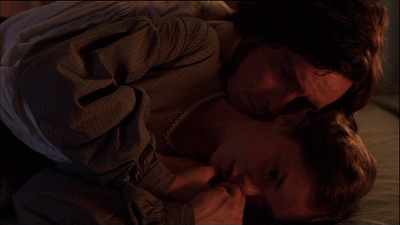 All these daydreams are far too much for Jane, who sobs like a child and does an ill conceived frog impression.
All these daydreams are far too much for Jane, who sobs like a child and does an ill conceived frog impression.
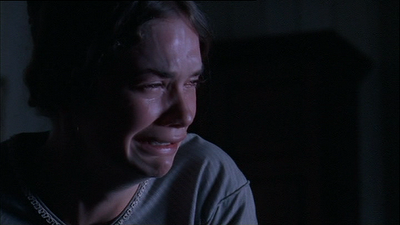 It seems to me that St. John is a far more punctilious boss than Rochester and has punctually paid Jane so that she can buy a new dress.
It seems to me that St. John is a far more punctilious boss than Rochester and has punctually paid Jane so that she can buy a new dress.
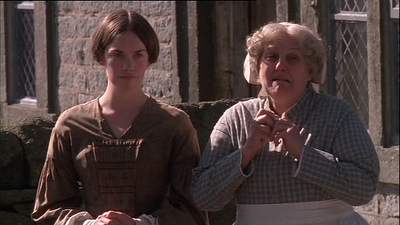 Rosamund Oliver comes to call on a horse and brings a few doves for the Dovecote. She asks if Jane is pleased with how she had set up the school and Jane says yes, instead of "Where are my floorboards?" St. John ignores Rosamund and she makes a petulant face and makes her servant walk all the way back up the moor.
Rosamund Oliver comes to call on a horse and brings a few doves for the Dovecote. She asks if Jane is pleased with how she had set up the school and Jane says yes, instead of "Where are my floorboards?" St. John ignores Rosamund and she makes a petulant face and makes her servant walk all the way back up the moor.
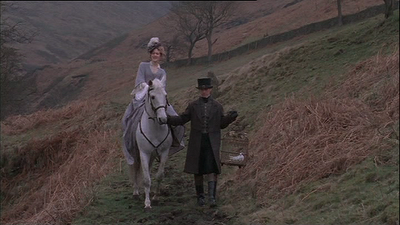 A year on, Jane has now become rich on her inheritance and has shared it out amongst herself and the Rivers. St. John has proposed to Jane as he wants her to come to the Cape with him and Jane is not keen on this state of affairs and is sitting by a babbling brook cogitating her options and hears an almost sepulchral "Jane, Jane!" She immediately decides to run back to Thornfield to see Rochester.
A year on, Jane has now become rich on her inheritance and has shared it out amongst herself and the Rivers. St. John has proposed to Jane as he wants her to come to the Cape with him and Jane is not keen on this state of affairs and is sitting by a babbling brook cogitating her options and hears an almost sepulchral "Jane, Jane!" She immediately decides to run back to Thornfield to see Rochester.
I want to make a note about the change in St. John's destination from India to Africa. It seems like a bizarre change to make, what language therefore is St.John asking Jane to learn, Swahili?
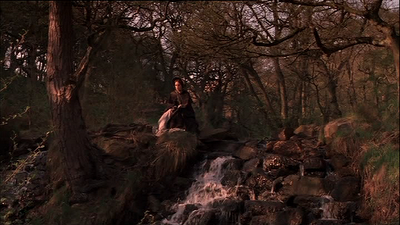 She rushes back to Thornfield and is dismayed to find that Thornfield is now a burnt out wreck.
She rushes back to Thornfield and is dismayed to find that Thornfield is now a burnt out wreck.
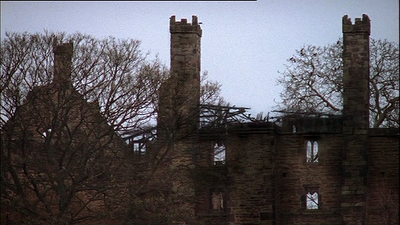 Jane sits in a field, taking comfort in the company of a few raggedy looking sheep and a kindly passing shepherd (who looks suspiciously like the one up on the moors) who tells her that Thornfield was burnt to the ground.
Jane sits in a field, taking comfort in the company of a few raggedy looking sheep and a kindly passing shepherd (who looks suspiciously like the one up on the moors) who tells her that Thornfield was burnt to the ground.
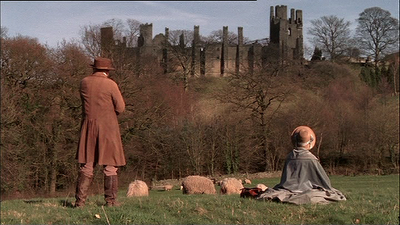 A figure wanders the corridors of Thornfield with a candle, and then decides to set Jane's old wedding dress on fire, possibly because the candle isn't giving out enough light and decides to drag it around the house like a pet dog, but obviously more aflame.
A figure wanders the corridors of Thornfield with a candle, and then decides to set Jane's old wedding dress on fire, possibly because the candle isn't giving out enough light and decides to drag it around the house like a pet dog, but obviously more aflame.
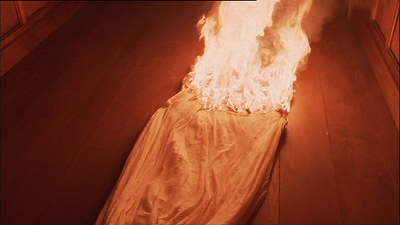 The arsonist turns out to be Bertha! Quelle Surprise! She dances on the roof of Thornfield in the flames and appears to be very happy until Rochester arrives to take her down.
The arsonist turns out to be Bertha! Quelle Surprise! She dances on the roof of Thornfield in the flames and appears to be very happy until Rochester arrives to take her down.
Claudia Coulter did the best job she could with the little she had. Her Bertha was mad, but not mad enough for me, she seemed far too petulant and magnificently well coiffed to be truly insane. I want drooling and crazy hair, but we got a restrained and downbeat performance, which is the adapters fault, not the actresses'. The mystery of the North Tower was elegantly introduced in the first two episodes, but the fact remains that despite the wildcat flailings of Bertha at Jane in the third episode, the reveal of the mad woman in the attic just wasn't as dramatic or kinetic enough to truly convince us of Bertha's insanity. She seems more of a piteous creature shut up alone in the North Tower, who can blame her for escaping at night ?(the mechanism for which is never explained: Grace Poole's gin habit isn't revealed).
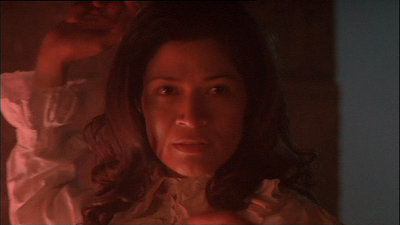 The theme of sexual jealousy was not overplayed by the script or the director, but it was evident, and in this adaptation at least it was appropriate. To have such an exotic and attractive Bertha, who was directly in contrast to plain Jane, was a brave move and one which ought to have been developed further; Jane and Bertha (despite her madness) could not help to be jealous of one another.
The theme of sexual jealousy was not overplayed by the script or the director, but it was evident, and in this adaptation at least it was appropriate. To have such an exotic and attractive Bertha, who was directly in contrast to plain Jane, was a brave move and one which ought to have been developed further; Jane and Bertha (despite her madness) could not help to be jealous of one another.
Rochester entreats Bertha to follow him down and take his hand, she sees an owl fly off the building and in a bid to escape the flames and the prison that Rochester has created for her, she longs to do the same. She, like Jane is a bird who wants to fly away, but when she flings herself into the air, she falls to her death. Rochester seems somewhat weary in this scene, his entreaties don't sound entirely sincere, if he wanted to stop Bertha, he could have grabbed her and physically taken her downstairs, I don't think he ever believed that Bertha would jump and thought that his request would be acceded to.
On a more shallow note, Toby Stephens in an open shirt with sooty smudges, mmm, nice! Heavens Bertha, go with him!
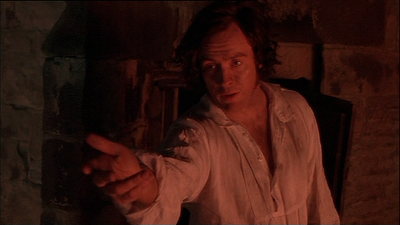 Thornfield burns merrily away, I'm not surprised that during filming neighbours of Haddon Hall, where Jane Eyre was filmed, were alarmed by the flames, it looks positively ablaze. I was disappointed that there wasn't a Rochester dodging flaming beams scene, it would have explained his burns and poorly arm.
Thornfield burns merrily away, I'm not surprised that during filming neighbours of Haddon Hall, where Jane Eyre was filmed, were alarmed by the flames, it looks positively ablaze. I was disappointed that there wasn't a Rochester dodging flaming beams scene, it would have explained his burns and poorly arm.
 Jane rushes to Ferndean, through a portentous wood and spies on Rochester walking out into his garden, when he looks over to her, her smile is wide, but it quickly fades as she realises that Rochester can't see her. Jane in this scene has another new dress, that St. John, he really does pay his wages on time.
Jane rushes to Ferndean, through a portentous wood and spies on Rochester walking out into his garden, when he looks over to her, her smile is wide, but it quickly fades as she realises that Rochester can't see her. Jane in this scene has another new dress, that St. John, he really does pay his wages on time.
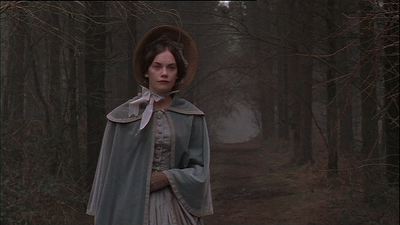 In the book, this scene takes place in the rain, but I suppose due to budgetary reasons this was changed. I however would have liked that to have remained in place, the rain makes Rochester look more vulnerable.
In the book, this scene takes place in the rain, but I suppose due to budgetary reasons this was changed. I however would have liked that to have remained in place, the rain makes Rochester look more vulnerable.
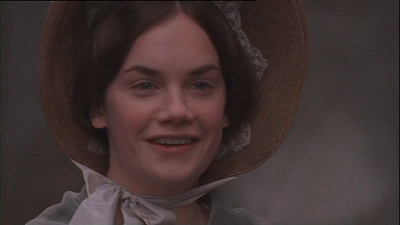 Rochester sits in his chair growling like a bear and demanding candles, Jane enters the room and Pilot recognising her starts to bark. Jane helps Rochester to drink, and he starts to realise that the servant probably isn't George as Jane gently mops his lips.
Rochester sits in his chair growling like a bear and demanding candles, Jane enters the room and Pilot recognising her starts to bark. Jane helps Rochester to drink, and he starts to realise that the servant probably isn't George as Jane gently mops his lips.
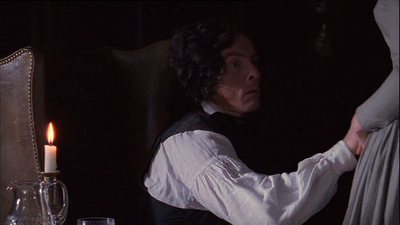 This is my favourite scene of the series bar none, the strength of Rochester's emotion is gasp inducing, Toby Stephens acting is superlative. From the moment he grabs Jane's arm when she speaks, his anguish and pain are written on his face. The way his voice breaks as he asks Jane: "You are real?" portrays completely all the emotion and vulnerability the character possesses. During this series, the strongest scenes have always been those in which Jane and Rochester interact, with both actors giving their all, in this scene, Toby gives his all and then reaches down into his tight britches and finds some more, all Ruth can do is react, which needless to say she does marvellously.
This is my favourite scene of the series bar none, the strength of Rochester's emotion is gasp inducing, Toby Stephens acting is superlative. From the moment he grabs Jane's arm when she speaks, his anguish and pain are written on his face. The way his voice breaks as he asks Jane: "You are real?" portrays completely all the emotion and vulnerability the character possesses. During this series, the strongest scenes have always been those in which Jane and Rochester interact, with both actors giving their all, in this scene, Toby gives his all and then reaches down into his tight britches and finds some more, all Ruth can do is react, which needless to say she does marvellously.
 The scene is made all the more difficult with Toby having to play blind as well, which is done sensitively and thankfully done without the eyerolling that some actors have to employ to show their blindness. As with the last episode, the small flickers of emotion that flit across his face amply display Rochester inner turmoil and sheer relief and joy at having Jane back with him again, the way he clasps her, he does not even mean to let her go. I think I can proudly state that I didn't see a single sneer from Toby Stephens during the series, which just goes to show he can control his sneer and that he can play sympathetic and compassionate fellows just as well as villains, better in fact.
The scene is made all the more difficult with Toby having to play blind as well, which is done sensitively and thankfully done without the eyerolling that some actors have to employ to show their blindness. As with the last episode, the small flickers of emotion that flit across his face amply display Rochester inner turmoil and sheer relief and joy at having Jane back with him again, the way he clasps her, he does not even mean to let her go. I think I can proudly state that I didn't see a single sneer from Toby Stephens during the series, which just goes to show he can control his sneer and that he can play sympathetic and compassionate fellows just as well as villains, better in fact.
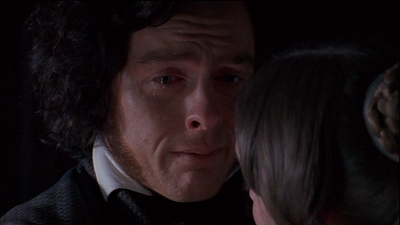 (I wish Rochester had said:"What sweet madness is this?" How's Thursday Next going to get home now?! )
(I wish Rochester had said:"What sweet madness is this?" How's Thursday Next going to get home now?! )
Jane positions herself on Rochster's knee and proceeds to fill him in on her year away. Rochester hasn't lost his hand and the small burn on his left hand side has been derided by some to be not bad enough. I think the burn is ample, it's enough to make him unsuitable for a society bride, Blanche Ingram would not countenance such a defect, but it cleaves Jane to him further. I can live without the amputated hand, as it appears that Rochester doesn't get his sight back at the end, he might as well as have two hands to hold his babies.
The scene with Jane and Rochester sitting by the fire, is a tender one, Jane tries to make Rochester's shaggy mane of hair more agreeable by passing a comb over it, not particularly well (she'll never make a hairdresser), but the thought was there. I like this new tactile Jane, it underlines the strength of her affection for Rochester, so strong that she can barely stop herself touching him.  Her wide smile as Jane leaves Rochester for the night, is a mixture of joy at returning and finding her love reciprocated and mischievous, she going to bed and leaving Rochester to wonder if she will return in the morning.
Her wide smile as Jane leaves Rochester for the night, is a mixture of joy at returning and finding her love reciprocated and mischievous, she going to bed and leaving Rochester to wonder if she will return in the morning.
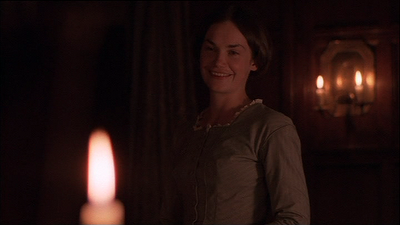 Obviously she does return in the morning and she and Rochester sit by the river while she cruelly describes the wildlife flitting around them, go on Jane rub in the fact you're not blind! Just joking, it is no doubt an allusion to Jane and Rochester's talent of talking all the time with is described in the book.
Obviously she does return in the morning and she and Rochester sit by the river while she cruelly describes the wildlife flitting around them, go on Jane rub in the fact you're not blind! Just joking, it is no doubt an allusion to Jane and Rochester's talent of talking all the time with is described in the book.
Rochester's burn and blind eye look realistic, the eye doesn't look fake blind and I'm glad they didn't do a Timothy Dalton and glue it closed.
Rochester tells Jane he wants a wife to share his bed all night and all day too if possible! I thought that was a wonderful line, despite his weakness and vulnerability now, he is still a snarky fellow and his intellect and humour had not been damaged, which is probably what Jane fell in love with, after all Rochester is not a handsome chap, despite all the evidence to the contrary.
Rochester's angst levels are still quite high, he knows that he's not a whole man anymore and doesn't know if Jane can love him now he's broken.
 Jane teases him with details of her stay with the Rivers and Rochester is jealous of St. John. He tells Jane that they could not be platonic, as he had once suggested they live as brother and sister, Jane agrees and says that Edward is all hers and kisses him. In a mirror of the bedroom scene, Jane pushes Rochester down and lies on top of him, thus cementing her new position as the mistress and Rochester the servant. Despite her slight frame, Rochester appears to be labouring for breath, so Jane obligingly starts the kiss of life routine.
Jane teases him with details of her stay with the Rivers and Rochester is jealous of St. John. He tells Jane that they could not be platonic, as he had once suggested they live as brother and sister, Jane agrees and says that Edward is all hers and kisses him. In a mirror of the bedroom scene, Jane pushes Rochester down and lies on top of him, thus cementing her new position as the mistress and Rochester the servant. Despite her slight frame, Rochester appears to be labouring for breath, so Jane obligingly starts the kiss of life routine.
Rochester ever the gentleman, runs his hand down her body to rest on her bum (I didn't learn this in the first aid course) and as Jane makes no protest at this, I'm sure she doesn't mind.
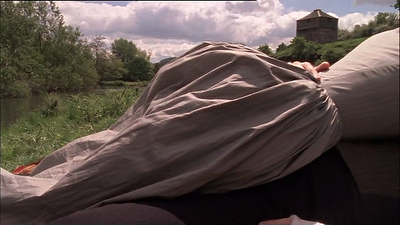 Ah, now they're knocking their boots together. Make your own assumptions. I like this image though, it shows us how much Edward and Jane are entwined and it's not something you would necessarily see at the end of a costume drama. At least it's not a kiss outside a church door.
Ah, now they're knocking their boots together. Make your own assumptions. I like this image though, it shows us how much Edward and Jane are entwined and it's not something you would necessarily see at the end of a costume drama. At least it's not a kiss outside a church door.
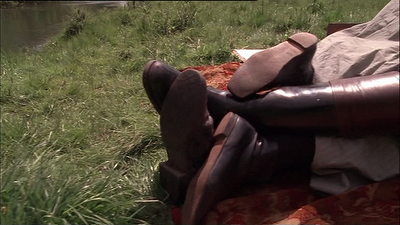 The family gathers for portraitit and Jane has a new dress, and looks resplendent with her curls. Rochester calls for his baby and Jane gets an unhappy child perched on her knee.
The family gathers for portraitit and Jane has a new dress, and looks resplendent with her curls. Rochester calls for his baby and Jane gets an unhappy child perched on her knee.
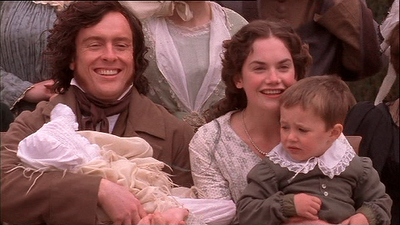 This last shot has got some pretty negative responses from many people, that they feel that it was too twee and schmaltzy to have everyone gather as if for a photograph. I liked it. You don't see this in a period drama and what it is showing is Jane's happy ever after. From an orphaned and abused young girl, she is now mistress of her own home and her husbands heart, with all her family around her, and not forgetting St. John peering out at us from the frame in his African paradise garden (or so it seems).
This last shot has got some pretty negative responses from many people, that they feel that it was too twee and schmaltzy to have everyone gather as if for a photograph. I liked it. You don't see this in a period drama and what it is showing is Jane's happy ever after. From an orphaned and abused young girl, she is now mistress of her own home and her husbands heart, with all her family around her, and not forgetting St. John peering out at us from the frame in his African paradise garden (or so it seems).
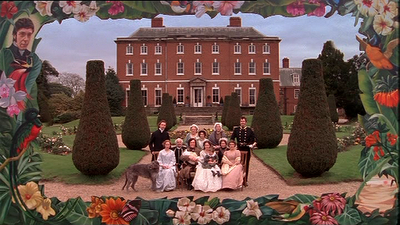
This is the first Jane Eyre adaptation I've ever seen, it was not perfect, the last episode flagged for not having a large amount of Jane/Rochester interaction, but on the whole, I thoroughly enjoyed it. Ruth Wilson was absolutely superb as Jane and so was Toby Stephens as Rochester, in my humble opinion they should both get awards for their performances, unfortunately it looks like very strong opposition this year, and romantic costume drama protagonists tend to get overlooked in lieu of actors playing straight dramatic roles. If they don't at least get nominated something is definitely wrong with the world!
Just before I end, I want to say thanks to everyone who's commented and read the blog, I hope you all enjoyed it. I will probably keep tabs on what Toby and Ruth continue to do and I might put a few reviews I've found on the blog. When the DVD comes out if it's full of extras I may not be able to stop myself from effusing enthusiastically!
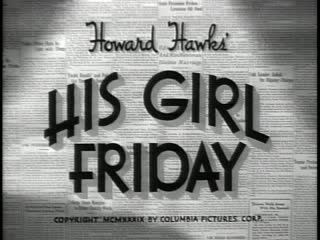

 as his star reporter Hilde Johnson, who is also his ex wife and is just about to marry Bruce, an insurance salesman from Albany.
as his star reporter Hilde Johnson, who is also his ex wife and is just about to marry Bruce, an insurance salesman from Albany. 





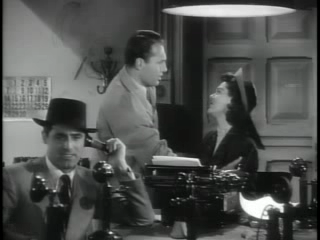



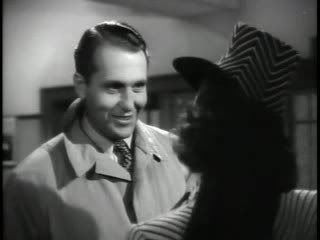


 I like the artful smudges of dirt that they have used here, it puts me in mind of Oliver! I almost expect her to burst into song. Jane's hair is so messy here because she left her bonnet beside a rock pool in her haste to escape the creepy shepherd that was watching the strange wandering lady, who was drinking from a rock pool. (In my real life, I analyse water for a living; believe me, you don't want to drink untreated water, I know what's in it! I hope that was a stunt pool, specially created, or it is what explains Ruth Wilson's illness during the shoot.)
I like the artful smudges of dirt that they have used here, it puts me in mind of Oliver! I almost expect her to burst into song. Jane's hair is so messy here because she left her bonnet beside a rock pool in her haste to escape the creepy shepherd that was watching the strange wandering lady, who was drinking from a rock pool. (In my real life, I analyse water for a living; believe me, you don't want to drink untreated water, I know what's in it! I hope that was a stunt pool, specially created, or it is what explains Ruth Wilson's illness during the shoot.) Jane is rescued by St.John (SinJun as it is pronounced) and his two "excitable" sisters. I put the word in quotes, because it is what Alison Graham in the Radio Times described them as. And she got it spot on. They were lively and generous, somewhat prone to flights of fancy and slightly intrusive questions such as: "Are you having a bad memory?" Their detective work was limited to reading the labels on Jane's dress; investigative masterminds these two aint. But I think they were portrayed elegantly and sparely, letting us know enough about them, without clogging up the narrative too much.
Jane is rescued by St.John (SinJun as it is pronounced) and his two "excitable" sisters. I put the word in quotes, because it is what Alison Graham in the Radio Times described them as. And she got it spot on. They were lively and generous, somewhat prone to flights of fancy and slightly intrusive questions such as: "Are you having a bad memory?" Their detective work was limited to reading the labels on Jane's dress; investigative masterminds these two aint. But I think they were portrayed elegantly and sparely, letting us know enough about them, without clogging up the narrative too much.  St. John Rivers, on the otherhand, is almost the opposite to his sisters, where they are lively and curious, he is dry and fastidious. I'd like to bring attention to the sterling work that Andrew Buchan did. He brought St. John to life and gave him the right amount of austerity and reserve, and without making him overly priggish and overbearing. This is a gentler man than in the novel, where he almost browbeats Jane into marrying him, here he is a man devoted to God and mindful of his position in society, so much so that he rebuffs Miss. Rosamund Oliver's friendly gestures.
St. John Rivers, on the otherhand, is almost the opposite to his sisters, where they are lively and curious, he is dry and fastidious. I'd like to bring attention to the sterling work that Andrew Buchan did. He brought St. John to life and gave him the right amount of austerity and reserve, and without making him overly priggish and overbearing. This is a gentler man than in the novel, where he almost browbeats Jane into marrying him, here he is a man devoted to God and mindful of his position in society, so much so that he rebuffs Miss. Rosamund Oliver's friendly gestures.  While walking on the Moors, Jane and the Rivers, meet Rosamund, who has been going out of her way to talk to and invite St. John to dinner. He, ever the insensitive idiot, refuses and she walks back dejected, wishing she hadn't put her best hat on. Her shoes also looked entirely unsuitable for a country walk.
While walking on the Moors, Jane and the Rivers, meet Rosamund, who has been going out of her way to talk to and invite St. John to dinner. He, ever the insensitive idiot, refuses and she walks back dejected, wishing she hadn't put her best hat on. Her shoes also looked entirely unsuitable for a country walk.

 Jane reminisces about her and Rochester's last meeting, which takes place, somewhat unwisely in her bedroom. Rochester, strokes and caresses and whispers huskily into her ears. Jane mutely allows him to do so (and is probably secretly enjoying it).
Jane reminisces about her and Rochester's last meeting, which takes place, somewhat unwisely in her bedroom. Rochester, strokes and caresses and whispers huskily into her ears. Jane mutely allows him to do so (and is probably secretly enjoying it).
 Having revived Jane, her promptly rolls off and looks over to make sure Jane is now breathing. Jane gasps a little for breath.
Having revived Jane, her promptly rolls off and looks over to make sure Jane is now breathing. Jane gasps a little for breath. This part of the scene was far more effective, Rochester tenderly holding Jane and whispering pleadings into her ear. If the entire scene had been done like this, I would have liked it better.
This part of the scene was far more effective, Rochester tenderly holding Jane and whispering pleadings into her ear. If the entire scene had been done like this, I would have liked it better. All these daydreams are far too much for Jane, who sobs like a child and does an ill conceived frog impression.
All these daydreams are far too much for Jane, who sobs like a child and does an ill conceived frog impression.












 The scene is made all the more difficult with Toby having to play blind as well, which is done sensitively and thankfully done without the eyerolling that some actors have to employ to show their blindness. As with the last episode, the small flickers of emotion that flit across his face amply display Rochester inner turmoil and sheer relief and joy at having Jane back with him again, the way he clasps her, he does not even mean to let her go. I think I can proudly state that I didn't see a single sneer from Toby Stephens during the series, which just goes to show he can control his sneer and that he can play sympathetic and compassionate fellows just as well as villains, better in fact.
The scene is made all the more difficult with Toby having to play blind as well, which is done sensitively and thankfully done without the eyerolling that some actors have to employ to show their blindness. As with the last episode, the small flickers of emotion that flit across his face amply display Rochester inner turmoil and sheer relief and joy at having Jane back with him again, the way he clasps her, he does not even mean to let her go. I think I can proudly state that I didn't see a single sneer from Toby Stephens during the series, which just goes to show he can control his sneer and that he can play sympathetic and compassionate fellows just as well as villains, better in fact.


 Jane teases him with details of her stay with the Rivers and Rochester is jealous of St. John. He tells Jane that they could not be platonic, as he had once suggested they live as brother and sister, Jane agrees and says that Edward is all hers and kisses him. In a mirror of the bedroom scene, Jane pushes Rochester down and lies on top of him, thus cementing her new position as the mistress and Rochester the servant. Despite her slight frame, Rochester appears to be labouring for breath, so Jane obligingly starts the kiss of life routine.
Jane teases him with details of her stay with the Rivers and Rochester is jealous of St. John. He tells Jane that they could not be platonic, as he had once suggested they live as brother and sister, Jane agrees and says that Edward is all hers and kisses him. In a mirror of the bedroom scene, Jane pushes Rochester down and lies on top of him, thus cementing her new position as the mistress and Rochester the servant. Despite her slight frame, Rochester appears to be labouring for breath, so Jane obligingly starts the kiss of life routine.

 This last shot has got some pretty negative responses from many people, that they feel that it was too twee and schmaltzy to have everyone gather as if for a photograph. I liked it. You don't see this in a period drama and what it is showing is Jane's happy ever after. From an orphaned and abused young girl, she is now mistress of her own home and her husbands heart, with all her family around her, and not forgetting St. John peering out at us from the frame in his African paradise garden (or so it seems).
This last shot has got some pretty negative responses from many people, that they feel that it was too twee and schmaltzy to have everyone gather as if for a photograph. I liked it. You don't see this in a period drama and what it is showing is Jane's happy ever after. From an orphaned and abused young girl, she is now mistress of her own home and her husbands heart, with all her family around her, and not forgetting St. John peering out at us from the frame in his African paradise garden (or so it seems).
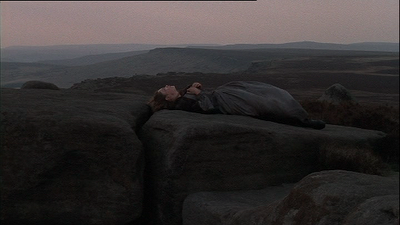 We meet St. John and his sisters, who take great care of Jane and nurse her back to health, she takes a job as a school mistress and despite her distance from Rochester, she finds herself thinking of him: his pleas for her to go and live with him in that "white washed villa" he talks of so much, are in her mind. The problem I had with that scene was the lying on top of poor Jane, get off, she's only small.
We meet St. John and his sisters, who take great care of Jane and nurse her back to health, she takes a job as a school mistress and despite her distance from Rochester, she finds herself thinking of him: his pleas for her to go and live with him in that "white washed villa" he talks of so much, are in her mind. The problem I had with that scene was the lying on top of poor Jane, get off, she's only small.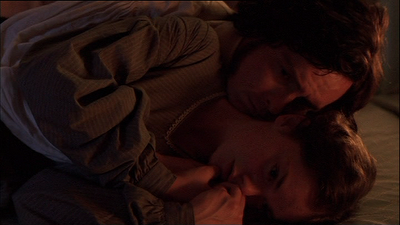 This episode wasn't the finest one, the second was, but it did have the best scene in the entire series: the reconciliation scene, which coincidentally was Toby Stephens best scene, all Ruth could do was react and if you didn't feel a little of his anguish at getting his Jane back, you have a heart of stone.
This episode wasn't the finest one, the second was, but it did have the best scene in the entire series: the reconciliation scene, which coincidentally was Toby Stephens best scene, all Ruth could do was react and if you didn't feel a little of his anguish at getting his Jane back, you have a heart of stone.